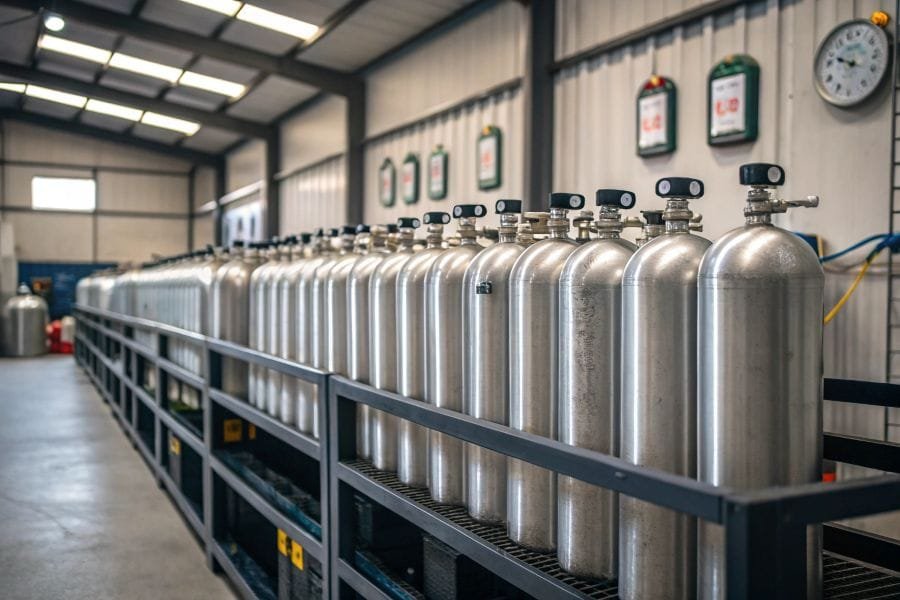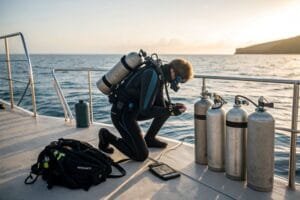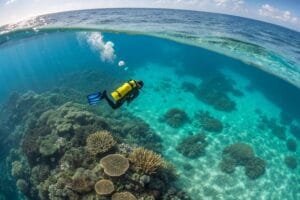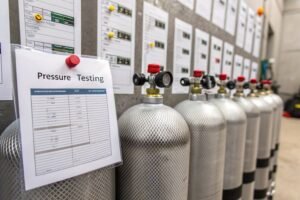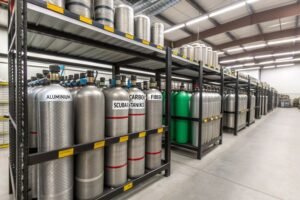Worried about missing the next big product trend? Your competitors are watching. This guide shows you a profitable new niche for your dive business.
Mini scuba tanks are becoming very popular for short, shallow dives, emergency air, and casual use. For a business owner like you, this creates a new and profitable market segment. It attracts new customers who might not buy a full-size tank.
I've been in the cylinder manufacturing business for a long time. Over the last few years, I've seen a big shift. More and more wholesalers, especially from North America and the Middle East, are asking me about smaller tanks. At first, I thought it was just a small trend. But the demand just keeps growing. It's not just for diving anymore; it's a whole new category of product. It made me realize that business owners who ignore this are leaving money on the table. Let's look into why this is happening and what it means for your business.
Why are more divers looking for small, refillable air tanks?
You see these small tanks online, but you wonder if there is a real market. Ignoring this trend could mean losing sales to more agile competitors. Here is why demand is growing.
The main drivers are convenience and new uses. People want them for quick, shallow dives, as a lightweight travel option, and as a reliable emergency air source. They are also used for tasks like boat cleaning or pool maintenance.
Exploring the Demand
The appeal of a small scuba tank isn't about replacing traditional gear. It's about filling new needs. When I talk to my clients, they tell me their customers fall into a few key groups. Understanding these groups helped one of my partners in Australia, much like yourself, tailor his marketing and triple his sales of mini cylinders in just one year.
- The Casual Explorer: This is the biggest new market. Think of snorkelers who want to go a little deeper, or tourists who want a 15-minute underwater experience without the full gear commitment. They want something simple and not intimidating.
- The Safety-Conscious Diver: Experienced divers are buying these as "bailout bottles" or "pony bottles." It's a secondary air source for emergencies. Safety is an easy sell, and these customers are willing to pay for peace of mind.
- The Traveling Diver: Luggage weight and space are always a concern. A small aluminum tank is much easier to pack for a trip that involves a few casual shore dives. It offers freedom from renting gear on every trip.
- The Specialist User: I was surprised to learn how many of our mini cylinders are sold to yacht owners for quick hull inspections or to untangle a fouled propeller. They are also used for pool repair and other industrial tasks that require short bursts of underwater work.
What are the key differences between aluminum, steel, and carbon fiber mini scuba tanks?
Choosing the wrong material can be a costly mistake. Stocking a product that doesn't fit your customers' needs can hurt your reputation and leave you with unsold inventory. Here is a clear breakdown.
Aluminum is the industry standard—light, rust-resistant, and affordable. Steel is very durable but heavy and can rust internally if not cared for. Carbon fiber is extremely light and strong but comes at a premium price.
A Deeper Dive into Materials
When a new buyer asks me for advice, the first thing we discuss is the material. The right choice depends entirely on the end-user's priorities: cost, weight, or durability. As a wholesaler, you need to know the pros and cons to guide your customers and manage your inventory effectively. Last year, I helped a distributor in the Middle East who was only stocking steel tanks. We introduced an aluminum line, and it quickly became his bestseller because it better suited the needs of the local recreational diving market.
Here is a simple table to compare the options:
| Feature | Aluminum Alloy (6061) | Steel | Carbon Fiber Composite |
|---|---|---|---|
| Weight | Moderate | Heavy | Very Light |
| Cost | $$ | $ | $$$$ |
| Corrosion Resistance | Excellent | Poor (can rust) | Excellent |
| Durability | Good (dents but doesn't crack) | Excellent (very tough) | Good (can be fragile to impact) |
| Typical Customer | Recreational Divers, Travelers | Commercial/Technical Divers | High-end Technical/Specialty |
Why Aluminum is Usually the Smartest Choice for Wholesalers
For the mini scuba tank market, aluminum alloy 6061 is the clear winner for most situations. It offers the best balance of performance and cost. It doesn't rust like steel, so it requires less maintenance and is safer from internal corrosion. It's lighter than steel, which is a key selling point for a "mini" tank. And most importantly, the price point makes it accessible to the largest group of potential buyers. At our factory, 90% of the mini tanks we produce are aluminum because it's what the market demands.
How can adding mini dive cylinders to your product line increase your revenue?
Is your revenue growth slower than you'd like? You need a fresh product to excite your customers and improve your margins. Mini scuba tanks are an easy and highly profitable addition.
They open up new customer segments like casual snorkelers and boat owners. They also create perfect upselling opportunities for refill services, pressure gauges, and carrying bags, boosting the value of every sale.
Unlocking New Streams of Income
Adding a new product isn't just about that one sale. It's about how it can grow your entire business. I always tell my partners to think of the "ecosystem" around the product. A mini scuba tank is a perfect example of a "gateway" product. It brings people in, and then you can serve them in many other ways.
- The Power of the Upsell: A customer buying a mini tank is the perfect candidate for a small pressure gauge, a custom carrying bag, or a hand pump for refilling. These small add-ons carry high-profit margins and are an easy yes for a customer who is already invested.
- Your Refill Business: This is the most important part for business owners like you who also have filling stations. Every single mini tank you sell is a customer who will come back to you again and again for refills. It turns a one-time purchase into a long-term customer relationship and a steady, recurring revenue stream.
- Creating Attractive Packages: One of our most successful clients in North America started offering a "Snorkeler Plus" package. It included a mask, fins, and one of our mini tanks. It became their most popular summer item. You can create bundles for boat safety, travel, or beginners, making the purchase decision easier for your customers and increasing your average order value.
What quality certifications should you demand from a scuba tank manufacturer?
You worry about safety, and you should. Selling a low-quality, high-pressure vessel is a huge liability that can ruin your business and your reputation. Know which certifications are non-negotiable.
At a minimum, your manufacturer must have ISO 7866 for seamless aluminum cylinders. Depending on your market, you will also need DOT (USA/Canada) or CE/PED (Europe) certifications. Never work with a supplier who cannot provide these.
Understanding What Matters for Safety
Certifications aren't just pieces of paper; they are a guarantee that the manufacturer follows strict rules for materials, production, and testing. When I started my factory, getting these certifications was my top priority. It's a lot of work, but it's the only way to prove you are serious about quality. When you are sourcing, don't be shy about asking for proof.
- ISO 7866: This is the international standard specifically for seamless aluminum alloy gas cylinders. It dictates everything from the type of aluminum used to the thickness of the walls and the testing procedures. If a manufacturer has this, it's a very good sign.
- DOT (Department of Transportation): If you sell in North America, this is mandatory. The "DOT-3AL" stamp on a cylinder means it meets the United States' strict regulations for construction and safety. We have extensive experience producing cylinders that meet this standard.
- CE / PED (Pressure Equipment Directive): This is the European equivalent of the DOT mark. The "CE" mark, accompanied by the Pi (π) symbol, means the cylinder can be legally sold across the European Union. It involves rigorous third-party inspection.
Asking a potential supplier "Are you certified?" is not enough. You should ask, "Can you show me your current ISO, DOT, and CE certificates?" A serious manufacturer will provide them immediately.
How can you identify a reliable wholesale supplier who guarantees quality and fast delivery?
You've faced the frustration of sourcing from overseas. Slow communication and unexpected delays cost you time and money. Here are the clear green flags to look for in a partner.
Find a real factory, not just a trading company. Check their certifications, ask about their production lines and capacity, and most importantly, test their communication. A fast, professional response is a sign of a good partner.
Finding a Partner, Not Just a Supplier
This is the most important step, and it's where so many buyers get frustrated. I've heard stories from new clients about suppliers who take a week to answer a simple email. That's unacceptable. Your business moves fast, and you need a partner who can keep up. This is where you separate the professional operations from the rest.
- Factory-Direct is Best: A factory has control over the entire process, from raw materials to final testing. This means better quality control, more stable pricing, and a direct line of communication. A trading company is just a middleman who adds cost and complexity. Ask for a virtual tour of their facility; we are always happy to show clients our five production lines in action.
- Communication is Everything: Send an inquiry. How long does it take to get a thoughtful reply? Is the English clear? Do they answer all your questions? This simple test tells you everything about how they will treat you after you've placed an order. My personal rule for my team is that every client inquiry gets a response within one business day.
- Check Their Capacity and Lead Times: Ask them directly: "If I order 1,000 units, what is your guaranteed lead time?" A good manufacturer with multiple production lines, like us, can give you a confident and reliable answer. A smaller or less organized supplier will be vague. This tells you if they can handle your growth.
Conclusion
Mini scuba tanks are a real and growing opportunity. Your success depends on choosing the right products and, more importantly, the right manufacturing partner who understands your business needs.

